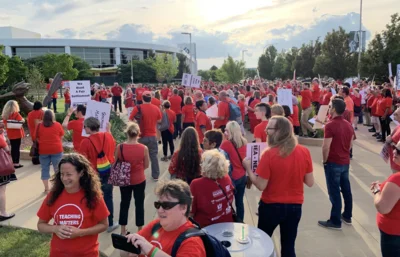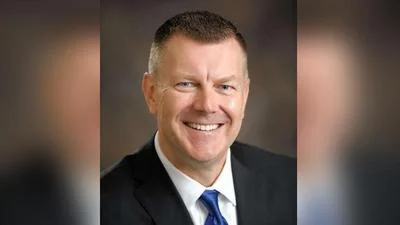Former president of the National Association of Broadcast Employees and Technicians Raza Siddiqui | Screenshot from CAN-TV
Former president of the National Association of Broadcast Employees and Technicians Raza Siddiqui | Screenshot from CAN-TV
Former president of the National Association of Broadcast Employees and Technicians Raza Siddiqui has raised concerns regarding an incident that occurred during early voting at the DuPage County Fairgrounds on Oct. 3, 2024.
In a letter to Illinois State Board of Elections Executive Director Bernadette Matthews, Siddiqui, a DuPage County resident and voter, expressed his dismay over the presence of an ABC 7 Chicago news photographer, Patrick Keating, who was allowed to record voters, including Siddiqui himself, during the voting process.
Siddiqui, who has been engaged in litigation with Keating over control of the broadcaster’s union, emphasized the potential for intimidation in a letter uncovered via a FOIA request to the Illinois State Board of Elections.

A photo of Patrick Keating provided to the Illinois State Board of Elections.
| Illinois State Board of Elections
"I believe every lawfully registered American voter has the right to vote free from interference and harassment, I therefore believe it is my duty to make you aware of this matter," Siddiqui wrote in his letter to Matthews.
He described the atmosphere at the polling place as "hostile," arguing that Keating's presence, particularly given their ongoing federal litigation, created a "chilling effect" on voters' rights.
"I let the election personnel know my objection immediately," he wrote. "Given this background I felt his being allowed in with the potential to videotape me while voting constituted harassment, intimidation as I personally felt unsafe while voting as a result."
Siddiqui highlighted that it is the responsibility of election officials to ensure a safe environment, insisting that "journalists... have a duty to adhere to good journalism," particularly when their presence could compromise the integrity of the voting process.
Siddiqui detailed his interactions with election officials, noting that he spoke to four poll workers about his concerns.
One official allegedly stated he was unsure why Keating was present, while Siddiqui said another encouraged him to continue voting despite his objections.
Siddiqui reflected on the discomfort he felt in the polling place.
"I felt distracted and unsafe while voting as a result," he said.
Siddiqui pointed out that the presence of the camera felt like a "weaponization... to intimidate," stating, "the potential to track me and my vote in what I perceived to be a threatening manner does not instill confidence."
Siddiqui referenced specific sections of Illinois election law, asserting that voters should be able to prepare their ballots without undue observation or intimidation.
Siddiqui also provided context regarding his ongoing litigation with Keating.
"In the first of two federal lawsuits, seven union members, myself included, prevailed in restoring union democracy to members of our broadcast union," he said.
Siddiqui described a pattern of obstruction and intimidation by Keating that has contributed to his heightened concerns during this election cycle.
"This situation highlights a larger issue of voter intimidation," Siddiqui said. "I thank you for taking the time to look into this complaint."
Siddiqui included a photo of Keating with the letter.
Siddiqui also called and exchanged emails with Sean Sarcu, Legal Counsel and Ethics Officer at the Illinois State Board of Elections.
Sarcu advised Siddiqui that the proper channel for investigating his allegations would be the DuPage County State's Attorney, as the State Board of Elections lacks jurisdiction over such claims.He also noted he would remind the DuPage County Board of Elections about state law protocols for screening and the privacy of voting booths.
Sarcu’s email to the DuPage County Board of Elections emphasized the importance of compliance with state law.
"The State Board of Elections (SBE) received a complaint from an individual who voted recently at the DuPage County Fairgrounds,” Sarcu wrote. “The individual states that the voting booths did not have curtains as required by law."
He referenced Illinois law, stating, “10 ILCS 5/17-8 provides, in relevant part: ‘The county clerk shall provide in each polling place… a sufficient number of booths… in which voters may prepare their ballots screened from all observation.’”
“Each of said booths shall have 3 sides enclosed, one side in front, to be closed with a curtain. Each side of each booth shall be 6 feet 4 inches and the curtain shall extend within 2 feet of the floor, which shall be closed while the voter is preparing his ballot,” 10 ILCS 5/17-8 reads in part.
Sarcu concluded by urging compliance.
“Please ensure that all DuPage County polling places comply with 10 ILCS 5/17-8’s enclosure and curtain requirements,” he wrote.
In 2022, Siddiqui and a group of plaintiffs suing Keating and others for union leadership received a temporary restraining order (TRO) that lifted a trusteeship imposed on NABET-CWA Local 41, ruling the trusteeship “invalid.”
The trusteeship was imposed six months after Siddiqui was elected president, amid claims of misconduct from the previous leadership, which the judge found to be without merit.
At the time U.S. District Court Judge Gary Feinerman referred the case for a settlement conference, stating that the plaintiffs have demonstrated a likelihood of success on the merits.
The TRO came after Siddiqui and six other officers from the National Association of Broadcast Employees and Technicians (NABET-CWA) Local 41, filed a lawsuit against several high-ranking officials of the union, including Keating, in 2022.
The plaintiffs sought the dissolution of what they claimed was an unlawful and bad faith trusteeship imposed on their local union.
According to the lawsuit, the trusteeship was imposed on Sept. 22, 2022, without any due process or proper hearings. “The true purpose in placing Local 41 in trusteeship was to oust and silence democratically elected officers,” the complaint states. The lawsuit added that the trusteeship was aimed at transferring control to political allies of those who had been defeated in the elections.
The plaintiffs detail a series of incidents that allegedly demonstrate misconduct by former officers, including Keating and Christopher Willadsen. They claim that after their electoral defeat, these individuals began a coordinated effort to undermine the newly elected leadership. This included withholding vital information, destroying records and refusing to hand over control of union assets and bank accounts.
In the lawsuit, Siddiqui recalls efforts to recover a laptop from former President Willadsen, which contained important data for the administration of Local 41. After finally receiving the laptop two months post-term, Siddiqui discovered that it had been intentionally damaged, leading to the destruction of critical records.
“Former President Willadsen’s actions were not just negligent; they were malicious,” Siddiqui claims in the lawsuit.
Additionally, the complaint highlights multiple internal charges filed against former officers for their refusal to transition control of bank accounts and assets following their defeat.
"Keating remained as the account holder and signatory on all accounts long after his term expired," the plaintiffs allege.
In 2024, Siddiqui refiled a complaint against key union figures, including Keating, in the U.S. District Court for the Northern District of Illinois, contending that his removal from office and the imposition of a trusteeship were unlawful.
In the complaint Siddiqui alleged multiple violations of labor laws and wrongful actions taken against him.
He cites violations of the Labor-Management Reporting and Disclosure Act (LMRDA), including damages for his removal from office, unlawful trusteeship, tortious interference with economic gain and civil conspiracy.
Siddiqui, who was elected in March 2021 by a significant margin, claims that Keating and Braico conspired to oust him from his leadership position to protect their political influence within the union.






 Alerts Sign-up
Alerts Sign-up